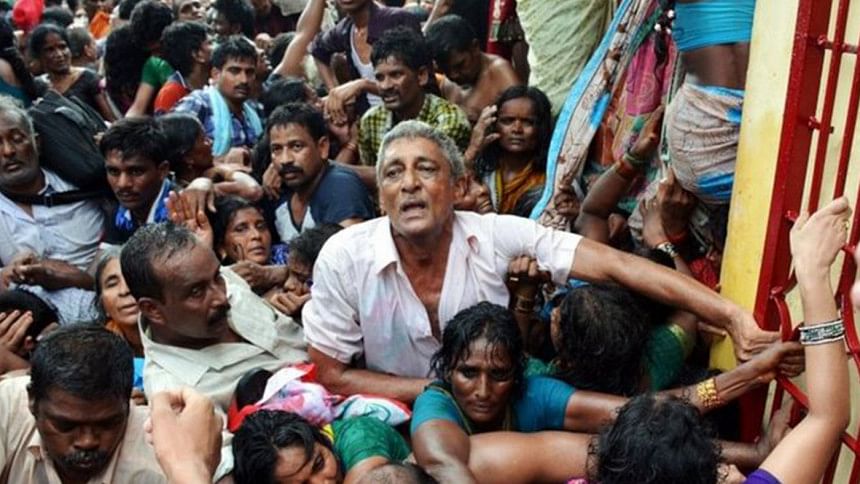India stampede kills 27 pilgrims

A stampede on the banks of a holy river killed at least 27 pilgrims Tuesday in southern India in a tragic beginning to a religious festival season.
The stampede in Rajahmundry, on the border of the twin states of Andhra Pradesh and Telangana, erupted about two hours after the dawn start of the Maha Pushkaralu festival which sees thousands of people bathe in the Godavari river.
"Twenty-seven people have now been confirmed dead in the stampede and another 29 are injured," Parakala Prabhakar, a spokesman for Andhra Pradesh's Chief Minister Chandrababu Naidu, told AFP.
District official H. Arun Kumar put the number of injured at 40 while confirming that 27 people had died.
While the identities of all the victims had yet to become clear, police and other officials said most of the victims were women and included a 15-year-old girl.
Images broadcast on television showed tearful relatives grieving over lines of bodies on the river bank.
Rescuers wearing life jackets could also be seen trying to haul lifeless bodies into their inflatable rafts which were patrolling the river.
A. Srinivasan Rao, a deputy superintendent of police in Andhra Pradesh, said the disaster happened when crowds built up around one set of steps leading to the water, known as ghats.
"The first set of worshippers were coming out of the river after taking a dip and then got in the way of others who wanted to be in the water at an auspicious time," Rao told AFP.
However Satyamurthy Chebolu, a volunteer for an organisation that helps run the festival, said the stampede happened when authorities sealed off a bathing ghat meant for the public in order to allow VIPs privacy.
The crowd apparently grew angry at being made to wait, and started pushing past the barriers.
"The problem was that they let VIPs go into the water while keeping the public at bay, so eventually the public got angry and demanded they be allowed to enter the ghat too," Chebolu told AFP from the scene.
"Some people started pushing from the back of the crowd, and that turned into a stampede where people got trampled. The police tried to stop them but the crowd easily pushed the police away.
"The crowd was huge -- there were maybe 20,000 people in the area, and maybe 3,000 people in the stampede. The ghat is just not built for that many people. It was also unbearably hot, so many people were anxious to cool off in the water."
MODI 'DEEPLY PAINED'
Prime Minster Narendra Modi wrote on Twitter that he was "deeply pained at the loss of lives" and offered condolences to the families of victims.
The chief minister's spokesman Prabhakar said that an ex-gratia compensation payment of one million rupees (around $15,750) had already been approved for victims of the stampede.
The start of Maha Pushkaralu coincides with the official beginning of the larger Kumbh Mela festival at Nashik in the western state of Maharashtra.
Millions of pilgrims are expected in Nashik over the next two months, the site of a stampede in which 39 people were killed when the Kumbh was last held there in 2003.
Only a few hundred people attended a flag-raising ceremony on Tuesday which marked the opening and mass crowds are not expected to gather until the first main bathing day on August 29.
Organisers expect up to ten million pilgrims to attend the main Kumbh Mela bathing dates, which fall on August 29, September 13 and September 18, and 20,000 police are being deployed to control the crowds.
The dates for the Kumbh Mela and the Pushkaralu festivals are set by religious leaders to coincide with the most auspicious days in the Hindu calendar.
Stampedes at India's religious festivals, where a mixture of police and volunteer stewards are often overwhelmed by the sheer size of the crowds, are not uncommon.
Around 115 people were killed in October 2013 at a stampede near a temple in the central state of Madhya Pradesh, site of another deadly stampede there seven years earlier.

 For all latest news, follow The Daily Star's Google News channel.
For all latest news, follow The Daily Star's Google News channel. 



Comments